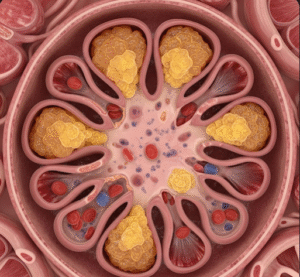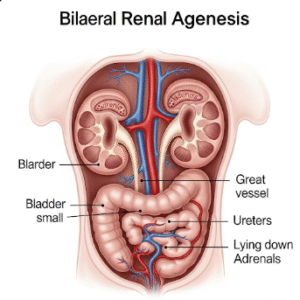Overview
Aphthous stomatitis, commonly known as canker sores, is a condition characterized by the recurring formation of small, painful ulcers inside the mouth. These ulcers are not contagious and typically heal on their own, but they can cause significant discomfort while eating, drinking, or speaking. Although the exact cause is unknown, several factors can trigger outbreaks. Treatments focus on relieving pain, speeding up healing, and preventing recurrence.
What is Aphthous Stomatitis?
Aphthous stomatitis is an oral mucosal disorder involving round or oval ulcers with a white or yellowish center and a red border. These ulcers commonly appear on the inner cheeks, lips, tongue, soft palate, or the floor of the mouth. It differs from cold sores, which are caused by the herpes virus and appear outside the mouth.
There are three main types:
- Minor Aphthous Ulcers: Small, shallow, and heal without scarring (most common).
- Major Aphthous Ulcers: Larger, deeper, and may cause scarring.
- Herpetiform Ulcers: Numerous tiny ulcers that may merge into larger ones.
Symptoms
- Small, painful ulcers in the mouth
- Burning or tingling sensation before ulcers appear
- Red halo around the ulcer
- Difficulty eating, drinking, or talking due to pain
- In severe cases, fever or swollen lymph nodes (rare)
Causes
The exact cause is unknown, but the following are believed to contribute:
- Minor injuries to the mouth (e.g., biting, dental procedures)
- Stress and anxiety
- Nutritional deficiencies (vitamin B12, iron, folic acid, zinc)
- Hormonal changes (e.g., menstruation)
- Food sensitivities (e.g., citrus, spicy foods, chocolate)
- Immune system dysfunction
- Certain medications (NSAIDs, beta-blockers)
- Genetics (family history increases risk)
Risk Factors
- Age: Common in teenagers and young adults
- Gender: Slightly more common in females
- Family history of aphthous ulcers
- Certain autoimmune or gastrointestinal diseases (e.g., Crohn’s disease, celiac disease)
- Smoking cessation (some former smokers develop ulcers after quitting)
Complications
- Severe pain and discomfort
- Difficulty maintaining oral hygiene
- Nutritional deficiencies due to eating difficulties
- Secondary bacterial infection (rare)
- Psychological impact from chronic pain
Prevention
- Avoid known trigger foods (acidic, spicy, or abrasive foods)
- Maintain good oral hygiene
- Use a soft-bristled toothbrush
- Manage stress through relaxation techniques
- Correct nutritional deficiencies through diet or supplements
- Avoid sodium lauryl sulfate-containing toothpaste
- Treat underlying medical conditions
Treatment Options in Korea
South Korea offers a range of advanced dental and oral medicine services to manage aphthous stomatitis effectively:
1. Diagnosis
- Clinical examination by a dentist or oral medicine specialist
- Blood tests for nutritional deficiencies or autoimmune markers (if ulcers are recurrent or severe)
2. Medications
- Topical corticosteroids (e.g., triamcinolone acetonide paste) to reduce inflammation
- Antiseptic mouthwashes (e.g., chlorhexidine) to prevent infection
- Topical analgesics (e.g., lidocaine gel) for pain relief
- Systemic corticosteroids for severe or persistent cases
- Vitamin and mineral supplements if deficiencies are found
3. Laser Therapy
- Some clinics offer low-level laser therapy for rapid pain relief and faster healing of ulcers.
4. Traditional Korean Medicine (Hanbang)
- Herbal mouth rinses and acupuncture are used in integrative treatment clinics to boost immune regulation and reduce recurrence.













